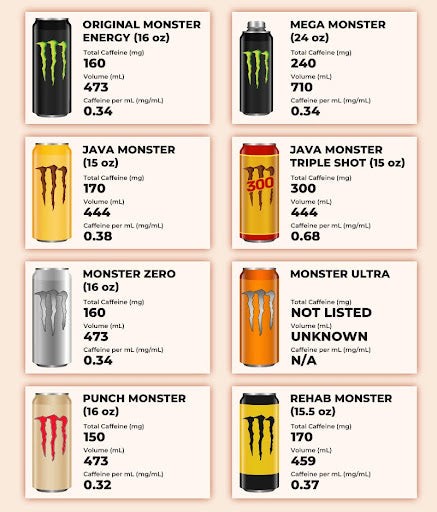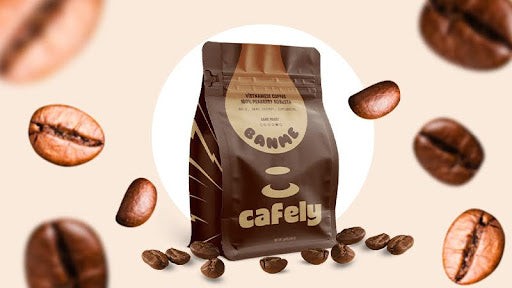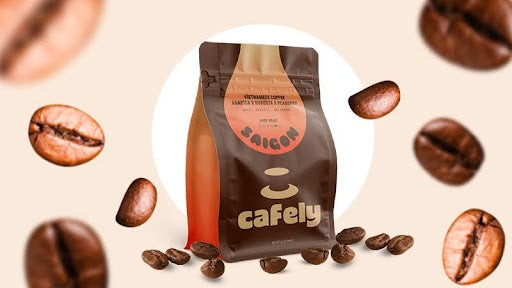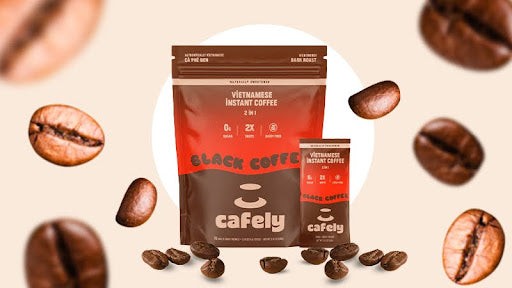Monster Energy drinks are a popular choice for a quick energy boost, but How Much Caffeine Does Monster Have? It varies, but a standard 16-ounce can of Monster Energy typically contains 160 milligrams of caffeine. This guide from HOW.EDU.VN will explore the caffeine content in different Monster Energy drinks, compare it to other beverages, and discuss the health implications of caffeine consumption. Knowing the caffeine levels in your energy drink and understanding its effects is crucial for making informed choices about your consumption. We’ll also touch on energy enhancement and stimulant beverages.
1. Caffeine Content in Monster Energy Drinks: A Detailed Breakdown
Monster Energy offers a diverse range of drinks, each with varying caffeine levels. Understanding these differences is essential for consumers to manage their caffeine intake effectively. This section provides a comprehensive overview of the caffeine content in popular Monster Energy drinks, along with insights into other active ingredients present in these beverages.
1.1. Caffeine Levels in Popular Monster Varieties
The caffeine content in Monster Energy drinks can vary significantly depending on the specific product. Here’s a breakdown of some of the most popular Monster Energy drinks and their corresponding caffeine levels:
| Monster Energy Drink | Serving Size | Caffeine Content |
|---|---|---|
| Monster Energy Original | 16 fl oz | 160 mg |
| Monster Energy Zero Ultra | 16 fl oz | 140 mg |
| Monster Energy Absolutely Zero | 16 fl oz | 150 mg |
| Monster Energy Rehab Lemonade Tea | 15.5 fl oz | 155 mg |
| Monster Energy Java | 15 fl oz | 188 mg |




As you can see, the caffeine content ranges from 140 mg to 188 mg per serving, depending on the specific Monster Energy drink. Consumers should be aware of these differences to manage their caffeine consumption and avoid exceeding their daily limits.
1.2. Additional Active Ingredients in Monster Energy Drinks
Besides caffeine, Monster Energy drinks contain several other active ingredients that contribute to their energizing effects. These ingredients include:
- Taurine: An amino acid that supports electrolyte balance and endurance.
- Inositol: A compound that aids in metabolism and energy production.
- L-Carnitine: A substance that helps convert fat into energy.
- B Vitamins: Essential for cell function and metabolism.
While these ingredients may sound beneficial, it’s important to note that their concentrations in energy drinks are often higher than what is naturally found in food or plants. According to dieticians, this could potentially lead to adverse health effects, especially when combined with caffeine. Studies have shown that the interaction between caffeine and other active ingredients in energy drinks may negatively impact arterial function by inhibiting proper dilation. Therefore, it’s crucial to consume Monster Energy drinks in moderation and be aware of the potential risks associated with these ingredients.
1.3. Recommendations for Consumption
Given the high caffeine content and the presence of other active ingredients, Monster Energy drinks are not recommended for certain individuals, including pregnant or nursing women, children, and people sensitive to caffeine. Even for healthy adults, moderation is key. It’s advisable to limit consumption and be mindful of the potential health implications associated with excessive intake of caffeine and other ingredients.
2. Monster Vs. Coffee: A Caffeine Comparison
When it comes to caffeine, how does Monster stack up against coffee? Let’s break it down. This section compares the caffeine content in Monster Energy drinks to that of various coffee types, providing a detailed analysis to help consumers make informed choices about their preferred caffeinated beverages.
2.1. Average Caffeine Content in Coffee
An average 8-ounce cup of coffee contains approximately 100 milligrams of caffeine, though this can vary depending on the type of coffee beans, brewing method, and coffee-to-water ratio. Factors that influence caffeine content in coffee include:
- Coffee-to-water ratio: A higher ratio results in a stronger, more caffeinated brew.
- Type of coffee beans: Dark roast Robusta beans generally contain more caffeine than Arabica beans.
- Brewing method: Different brewing methods, such as drip, pour-over, or French press, can affect caffeine extraction.
Even a strong cup of Vietnamese coffee, known for its high caffeine content, may not contain as much caffeine as a single can of Monster Energy Original.
2.2. Caffeine Comparison Table: Monster Vs. Coffee
Here’s a detailed comparison of the caffeine content in Monster Energy drinks compared to various types of coffee:
| Type of Coffee | Serving Size | Caffeine Content |
|---|---|---|
| Vietnamese Coffee | 2-4 oz | 66-130 mg |
| Espresso (Single Shot) | 1-2 shots | 75-150 mg |
| Pour-Over Coffee | 8 oz | 90-160 mg |
| Cold Brew Coffee | 16 oz | 197-213 mg |
| French Press Coffee | 8 oz | 100-137 mg |
| Drip Coffee | 8 oz | 65-120 mg |
| Instant Coffee | 8 oz | 80-120 mg |
| Monster Energy Original | 16 fl oz | 160 mg |
As the table illustrates, Monster Energy Original contains a comparable amount of caffeine to a strong cup of coffee, such as pour-over or cold brew. However, some coffee varieties, like Vietnamese coffee or espresso, may contain less caffeine per serving.
2.3. Health Considerations
While both Monster Energy drinks and coffee can provide a caffeine boost, there are important health considerations to keep in mind. Coffee is a natural, plant-derived beverage that contains antioxidants and nutrients. On the other hand, Monster Energy drinks often contain added sugars, artificial flavors, and other additives. For those seeking a healthier alternative, coffee may be a better choice.
2.4. Strongest Coffee Alternatives
If you’re looking for a coffee that packs a serious caffeine punch, here are a few options that rival or exceed the caffeine content of Monster Energy drinks:
- Cafely BanMe Coffee: Optimized for strength with 9000 mg of caffeine per bag.
- Cafely SaiGon OG Coffee: Delivers approximately 120-150 milligrams of caffeine per cup.
- Cafely Instant Coffee Packs: Contains 150 mg of caffeine per pack, with new packs offering double that amount.
These coffee options provide a natural and potentially healthier way to get your caffeine fix compared to energy drinks.
3. Monster Vs. Other Energy Drinks: Caffeine Showdown
Monster isn’t the only energy drink on the market. In this section, we’ll compare its caffeine content to other popular energy drinks, providing you with a clear picture of where it stands in terms of caffeine potency.
3.1. Caffeine Content Comparison Table: Energy Drinks
Here’s a table comparing the caffeine content of Monster Energy drinks to other popular energy drinks:
| Drink | Serving Size | Caffeine Content | Caffeine Per oz |
|---|---|---|---|
| Bang | 16 fl oz | 300 mg | 18.75 mg / oz |
| Monster | 16 fl oz | 160 mg | 10 mg / oz |
| Red Bull | 8.5 fl oz | 80 mg | 9.6 mg / oz |
| Rockstar | 16 fl oz | 160 mg | 10 mg / oz |
| Regular Coffee | 8 oz / 240 mL | 80–100 mg | 10 mg / oz |
| Decaf Coffee | 8 oz / 240 mL | 0–7 mg | ~1 mg / oz |
| Black Tea | 8 oz / 240 mL | 60 mg | 5 mg / oz |
| Matcha | 8 oz / 240 mL | 100 mg | 12.5 mg/oz |
As you can see, Bang energy drinks contain the highest amount of caffeine per serving, while Red Bull has the lowest. Monster Energy drinks fall in the middle, with 160 mg of caffeine per 16-ounce can.
3.2. Implications of Caffeine Levels
The caffeine content in energy drinks can have significant implications for consumers, especially those who are sensitive to caffeine or have underlying health conditions. High caffeine levels can lead to side effects such as:
- Jitters
- Insomnia
- Anxiety
- Changes in heart rate
- Headaches
- Upset stomach or nausea
It’s crucial to be aware of the caffeine content in your energy drink of choice and consume it in moderation to avoid these adverse effects.
3.3. Choosing the Right Energy Drink
When choosing an energy drink, consider your individual caffeine tolerance and preferences. If you’re looking for a strong caffeine boost, Bang may be your go-to option. However, if you prefer a more moderate caffeine level, Monster or Red Bull may be more suitable choices. Additionally, be mindful of other ingredients in energy drinks, such as added sugars and artificial flavors, and opt for options with lower levels of these additives.
4. About the Monster Energy Corporation
To better understand the brand, let’s take a look at the company behind Monster Energy. This section provides an overview of the Monster Energy Corporation, including its history, financial performance, and market share.
4.1. History and Background
Monster Energy is a subsidiary of the Monster Beverage Corporation, a holding company based in California. The company develops and markets various energy drinks, including Monster Energy, Monster Energy Ultra, and Monster MAXX. Originally founded as Hansen’s in 1935, the company initially sold juice products before rebranding as Monster Beverage in 2012.
4.2. Financial Performance
Monster Beverage Corporation has experienced significant growth in recent years. In the first quarter of 2024, the company reported an 11.8% increase in net sales, reaching $1.90 billion compared to $1.70 billion in the same period of 2023. The Monster Energy Drinks segment saw a 10.7% increase in net sales, totaling $1.73 billion for the 2024 first quarter, up from $1.56 billion in 2023.
4.3. Market Share
Based on U.S. dollar sales, the Monster Energy brand held a market share of 29.7 percent in 2023, making it the second-leading energy drink brand in the United States, behind only Red Bull.
5. Health Implications of Caffeine Consumption
Caffeine can have both positive and negative effects on your health. It’s crucial to understand these implications to make informed decisions about your caffeine intake. This section explores the health implications of caffeine consumption, including recommended daily limits, potential side effects, and special considerations for certain populations.
5.1. Recommended Daily Caffeine Intake
According to health experts, healthy adults can safely consume up to 400 mg of caffeine per day, which is equivalent to about four or five cups of coffee. However, individual tolerance to caffeine can vary, and some people may experience negative side effects even at lower doses.
5.2. Potential Side Effects of Excessive Caffeine Intake
Consuming too much caffeine can lead to a range of adverse effects, including:
- Jitters
- Insomnia
- Anxiety
- Changes in heart rate
- Headaches
- Upset stomach or nausea
If you experience these symptoms, it may be necessary to reduce your caffeine intake or eliminate it altogether.
5.3. Factors Affecting Caffeine Sensitivity
Several factors can influence how caffeine affects you, including:
- Body weight
- Medications
- Individual sensitivity
- Metabolism rate
Additionally, pregnant women, women trying to conceive, and breastfeeding mothers should consult their doctor about safe caffeine limits.
5.4. Caffeine and Children
The Food and Drug Administration (FDA) has not established a recommended caffeine intake level for children. However, the American Academy of Pediatrics advises against caffeine consumption for children and adolescents. Studies suggest that dietary intake of caffeine should be discouraged for all children due to potential risks associated with excessive consumption.
5.5. Potential Risks of Excessive Caffeine Consumption
Excessive caffeine consumption can lead to serious health consequences. In extreme cases, toxic effects such as seizures can occur with rapid consumption of around 1,200 mg of caffeine or 0.15 tablespoons of pure caffeine. Pure and highly concentrated caffeine products, often labeled as dietary supplements, can be particularly dangerous and may even result in death.
6. FAQs: Caffeine in Monster Energy
Let’s address some common questions about caffeine in Monster Energy drinks.
6.1. How much caffeine is in a standard can of Monster Energy?
A standard 16-ounce can of Monster Energy contains 160 milligrams of caffeine. However, caffeine levels may vary depending on the specific Monster product.
6.2. Is it safe to drink Monster Energy every day?
It’s best to consume energy drinks in moderation rather than as a regular habit. The FDA recommends that adults consume no more than 400 mg of caffeine per day.
6.3. How does the caffeine in Monster compare to a cup of coffee?
The caffeine content in Monster Energy is comparable to a strong cup of coffee. However, some coffee varieties may contain more or less caffeine than Monster.
6.4. Can you experience caffeine withdrawal from Monster?
Yes, caffeine withdrawal can occur when you suddenly stop consuming caffeine after regular use. Symptoms of caffeine withdrawal may include headaches, fatigue, irritability, and low mood.
6.5. What are healthier caffeine alternatives to Monster?
Coffee, black tea, and green tea are generally healthier caffeine alternatives to Monster Energy drinks. These beverages are natural, plant-derived, and contain antioxidants and other beneficial compounds.
6.6. Does Monster Energy contain natural or synthetic caffeine?
Monster Energy may contain synthetic caffeine, as it is not derived from natural sources like coffee beans or tea leaves. Additionally, energy drinks often contain added sugars, artificial flavors, and other additives.
6.7. What are the effects of Monster Energy on long-term health?
Long-term consumption of Monster Energy drinks may have adverse effects on health due to high caffeine levels, added sugars, artificial flavors, and other additives. Limited research is available on the long-term effects of many ingredients in energy drinks, especially when combined with caffeine.
6.8. How long does the caffeine effect from a Monster last?
The caffeine boost from a Monster Energy drink typically lasts for 6-9 hours, similar to other caffeinated beverages. Other active ingredients in Monster may prolong the effects of caffeine.
6.9. Are there any Monster Energy drinks without caffeine?
As of now, there are no zero-caffeine options in the Monster Energy product line.
6.10. What is the maximum amount of Monster one should drink in a day?
According to the warning label on Monster Energy Zero Ultra cans, it is recommended to consume no more than one can every 4 hours, with a limit of 3 cans per day. Monster Energy drinks are not recommended for children, people sensitive to caffeine, pregnant women, or women who are nursing.
Navigating the world of caffeine can be tricky, but understanding the caffeine content of popular energy drinks like Monster is a great start. If you’re seeking expert guidance on managing your caffeine intake or addressing any health concerns related to energy drinks, HOW.EDU.VN is here to help. Our team of experienced doctors and specialists can provide personalized advice and support to help you make informed decisions about your health.
7. Need Personalized Advice?
Are you looking for personalized advice on managing your caffeine intake or addressing specific health concerns related to energy drinks? HOW.EDU.VN connects you with leading doctors and specialists worldwide who can provide expert guidance tailored to your individual needs.
7.1. Connect with Expert Doctors and Specialists
HOW.EDU.VN offers a platform to connect with experienced doctors and specialists from various fields. Whether you have questions about caffeine sensitivity, potential health risks, or alternative energy sources, our experts can provide valuable insights and recommendations.
7.2. Personalized Guidance and Support
Our team of experts understands that everyone’s health needs are unique. That’s why we offer personalized guidance and support to help you make informed decisions about your health and well-being. Whether you need advice on managing caffeine intake, addressing specific health concerns, or exploring alternative energy sources, our experts are here to help.
7.3. Convenient and Accessible Consultations
HOW.EDU.VN makes it easy to access expert medical advice from the comfort of your own home. Our platform offers convenient and accessible consultations through various channels, including video calls, phone calls, and online messaging.
Don’t let questions about caffeine and energy drinks weigh you down. Contact our team of expert doctors at HOW.EDU.VN today for personalized guidance and support. Reach out to us at 456 Expertise Plaza, Consult City, CA 90210, United States, or connect via WhatsApp at +1 (310) 555-1212. You can also visit our website at HOW.EDU.VN to learn more.
8. References
- Higgins, J. P., Yang, B., Herrin, N. E., Yarlagadda, S., Le, G. T., Ortiz, B. L., … & Infanger, S. C. (2017). Consumption of energy beverages is associated with attenuation of arterial endothelial flow-mediated dilatation. World journal of cardiology, 9(2), 162.
- Liang, N., & Kitts, D. D. (2014). Antioxidant property of coffee components: assessment of methods that define mechanisms of action. Molecules, 19(11), 19180-19208.
- Liang, Ningjian and Kitts, David D. (2014). Antioxidant Property of Coffee Components: Assessment of Methods that Define Mechanisms of Action. Vancouver, Canada. University of British Columbia Molecules.10.3390/molecules191119180
9. Unlock Expert Insights on Health and Wellness with HOW.EDU.VN
Are you seeking reliable, expert-backed guidance on a range of health and wellness topics? HOW.EDU.VN is your premier destination for connecting with leading doctors and specialists from around the globe. Our platform offers personalized consultations and in-depth insights to empower you to make informed decisions about your well-being.
9.1. Explore a Wide Range of Health Topics
HOW.EDU.VN covers a diverse array of health topics, including:
- Nutrition and Diet
- Fitness and Exercise
- Mental Health and Wellness
- Chronic Disease Management
- Preventive Care
- And much more!
Our team of experts provides evidence-based information and practical tips to help you optimize your health and live your best life.
9.2. Access Expert-Backed Information
All of the content on HOW.EDU.VN is created and reviewed by experienced doctors and specialists. You can trust that the information you find on our platform is accurate, up-to-date, and aligned with the latest medical research.
9.3. Take Control of Your Health Today
Visit HOW.EDU.VN today to explore our extensive library of health resources and connect with expert doctors and specialists. Take control of your health and start living a happier, healthier life!
10. Frequently Asked Questions About Expert Consultations at HOW.EDU.VN
Do you have questions about how HOW.EDU.VN can help you connect with leading doctors and specialists? Here are some frequently asked questions to provide you with a better understanding of our services:
10.1. What types of experts can I find on HOW.EDU.VN?
HOW.EDU.VN features a diverse network of doctors and specialists from various fields, including:
- General Practitioners
- Cardiologists
- Endocrinologists
- Nutritionists
- Mental Health Professionals
- And many more!
10.2. How can I schedule a consultation with an expert?
Scheduling a consultation is easy. Simply browse our directory of experts, select the specialist you’d like to consult with, and follow the instructions to book an appointment.
10.3. What are the benefits of consulting with an expert through HOW.EDU.VN?
Consulting with an expert through HOW.EDU.VN offers several advantages, including:
- Personalized guidance and support
- Convenient and accessible consultations
- Access to leading doctors and specialists from around the world
- Evidence-based information and recommendations
10.4. Is my personal information kept confidential?
Yes, we take your privacy seriously. All personal information shared on our platform is kept confidential and protected by our strict privacy policy.
10.5. How much does it cost to consult with an expert on HOW.EDU.VN?
Consultation fees vary depending on the expert and the type of service provided. Please refer to the individual expert’s profile for pricing information.
11. Embrace a Healthier Lifestyle with Expert Guidance from HOW.EDU.VN
Your journey to optimal health and wellness begins here. At how.edu.vn, we are dedicated to providing you with the resources, expertise, and support you need to make informed decisions about your health and well-being. Connect with our team of leading doctors and specialists today and take the first step towards a happier, healthier life!